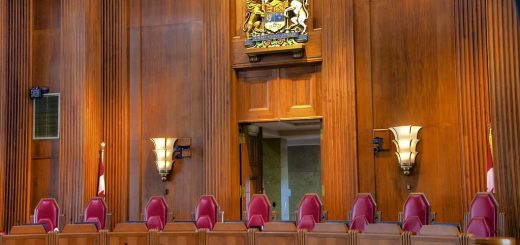Revisiting Sir Lyman Poore Duff: A Transatlantic Life Immersed in Political Thought
Canada’s eighth Chief Justice, Sir Lyman Duff, sits in his easy chair by the roaring fire in his home at 488 Wilbrod Street. Kenneth Campbell, his assistant, occupies a familiar place by his side. Campbell pores over the books that range in topic from the latest works on atomic energy to the political philosophy of Blackstone, which had been loaned to him by the Chief Justice so they could discuss their contents together. Duff, who adhered strictly to his daily routine, always reserved his evenings for such discussions, moments that Campbell remembered fondly: “These hours with Sir Lyman were a stimulating education and could not in any manner be considered work” (Kenneth Campbell, “The Right Honourable Sir Lyman Poore Duff, P.C., G.C.M.G.: The Man As I Knew Him,” 249).
Inspired by Canada’s sesquicentennial in 2017, this post invites readers to revisit the life of Canada’s longest serving justice of the Supreme Court of Canada (SCC). I will argue that in order to understand the rulings Duff made over his 37 years on the bench, we need to situate his thinking within the transatlantic conversation on political thought in which he participated. By looking to the intellectual origins of Duff’s decisions, the books he read, and the relationships he made with the great minds of his time, we can better understand the ideological climate in which some of the SCC’s most formational decisions—at least, in terms of our constitution and independence from Britain—were made. As Richard Gold notes, during Duff’s time on the SCC, “Duff and the Court faced important issues concerning the meaning of the constitution…[including] the change from a classical liberal tradition to a less rigid, more responsive theory of law” (“Sir Lyman Duff and the Fork in the Road,” 424-25). Moreover, we gain a fuller appreciation of Canada’s legal tradition and one of its most influential jurists by shifting this time period into its appropriate frame. As Chief Justice Dickson has pointed out, “the study of constitutional issues cannot be severed from historical origins, social contexts, and – perhaps most importantly – the persons who shaped them” (Foreword to Gordon Bale’s Chief Justice William Johnstone Ritchie: Responsible Government and Judicial Review). The time period relevant to Duff’s work is what historian Michel Ducharme has referred to as cis-Atlantic history. Ducharme clarifies in his book, The Idea of Liberty in Canada During the Age of Atlantic Revolutions, that cis-Atlantic history is “[Canadian] history told as part of a broad Atlantic history.”
To those close to him, Duff was known as a “prodigious worker” and a skilled conversationalist with a photographic memory and a love for tea (Campbell, 250). To those who only knew him as a judge, he was known for his patience: “[N]o pleader has ever appeared [before him] who has not been afforded full opportunity, indeed who has not been patiently guided and helped, to make a full demonstration of his case” (Campbell, 251). Campbell also recalls Duff’s unparalleled ability to simplify difficult concepts:
“I recall one time when a difficult patent case was under consideration. My own experience with science and mathematics was limited and I told Sir Lyman that I would never be able to understand the point in dispute. Sir Lyman refused to take me at my word, and with pencil and pad, laid out the problem with a precision and clarity that I still marvel at. This, and many other similar instances, demonstrated not only the breadth of his mind but also the fact that he [was] a great teacher” (Campbell, 249).
But perhaps more than anything else, Duff was remembered as an “omnivorous reader” (Campbell, 250). Duff made weekly trips to the Parliamentary Library to borrow books (which he didn’t always return) and to chat with his friend, Francis Hardy. As Campbell describes, Hardy once showed Grattan O’Leary the list of books that Duff had borrowed from the Parliamentary Library, and O’Leary marvelled at the variety, and number, of books Duff had read:
“During the years that he was Chief Justice, while travelling to England for sittings of the Judicial Committee of the Privy Council, Sir Lyman must have been immersed in the law. Yet during this period he was finding time to read books such as these: Trotsky’s Problems of Life, Morris’ Beethoven, Oman’s Studies in the Napoleonic Wars, Duncan’s Essentials of Astronomy, Hauwitz’s Physical State of the Upper Atmosphere, Hammond’s Gladstone and the Irish Nation, Low’s Political History of England, Lecky’s Nationalism in Europe, Barnes’ Scientific Theory and Religion, Asquith’s Occasional Addresses. Scientific Research and Discoveries interested him constantly. Thus, in 1936, almost a decade before an atomic bomb fell upon Hiroshima, he was reading Gamow’s Atomic Energy, and in the same year he took out of the library Montgomery’s The Story Behind Great Medical Discoveries, Epstein’s Miracles from Microbes, Slotter’s New Science of Surgery, and Conant’s On Understanding Science” (Campbell, 251).
Chief Justice Rinfret, Duff’s successor as Chief Justice, was similarly amazed when he visited Duff in hospital during a bout of lengthy illness. As Campbell recalls, Duff had been secluded from visitors for a lengthy amount of time. When Rinfret was finally allowed to see Duff, he experienced quite the sight:
“When I entered his room in the hospital, I found the walls lined with books – Sir Lyman was a great reader. They were books of all kinds: religion, philosophy, mathematics, natural sciences, history, fiction, detective stories, and so on, and law, naturally…[and] ninety percent of the books were French” (Campbell, 251).
Moreover, Duff’s sister Annie recalled that as a child, Duff would “as soon sit with a book as play with his fellows” and was known to spend six hours a day reading (David Williams, Duff: A Life in the Law, 7). Apparently, Duff inherited his love of reading from his mother, an intellectual who saw “books and classical literature…on a plane with formal religion” (Williams, 4). When Duff’s close friend, Douglas Alexander, started to work in a law office, supposedly copying documents, an ambitious young Duff wrote to him: “Do you only have the writing to do in your office; and do you have the use of the law books! I am thinking something of trying to get a situation in one next winter” (Williams, 10). Fast forward many years later: Duff and his wife, Lizzie, are looking for their first house together, and Duff insists that their house have “ample space for his many books” (Williams, 42). In fact, an entire room was dedicated to storing books, and at the end of his career, his library was appraised at twenty-five thousand dollars. As David Williams, his lone biographer notes, “it is hard to imagine a field unrepresented in his library: he had cookbooks, novels by Disraeli, medical journals and texts, detective stories, Herodotus, Boswell, scientific works like Maxwell’s Matter and Motion, tomes on economics – the range was astonishing” (Williams, 264).
It is also important to understand the personal relationships that inspired, and indeed facilitated, Duff’s ideas and political thought. Throughout his career, Duff acted on a transatlantic stage, frequently travelling to Britain and France and accordingly, his friendships were “deep and wide-ranging” (Campbell, 250). For a brief period, Duff worked as Queen’s Counsel, the highlight of which was a trip to England to contend the boundary line between Alaska and British Columbia. It was on this trip when Duff met some of his closest friends, including renowned Canadian lawyer Aimé Geoffrion. It was also when he made a lasting impression on many of England’s most important legal actors (Campbell, 246). Upon his return to Canada, Duff was appointed to the Supreme Court of British Columbia in 1904, and then the Supreme Court of Canada in 1906. He became quite close with Prime Minister Robert Borden, with whom he often exchanged books and talked politics (Williams, 117).
In 1919, Duff was made a member of His Majesty’s Privy Council and was invited to sit on the Judicial Committee of the Privy Council in London. As Campbell recalls, “there is no doubt that he was regarded with esteem by his British colleagues nor that he valued his trips to England and his opportunities of renewing old acquaintances immensely. His British Brethren even made him an Honourary Bencher of Gray’s Inn” (Campbell, 247). The Duffs also visited France frequently for holiday, during which Duff spoke French with the locals and read French novels avidly (Williams, 131). In Canada, Campbell recounts that Duff was a member of a small Ottawa fraternity known as the Fortnightly Dining Out Club in which a “different member would act as host for each meeting, and that member was allowed to bring along one guest. The membership was by no means confined to people with legal training – that would not have suited Sir Lyman’s far reaching tastes at all” (Campbell, 250). Instead, the guests, and conversations ranged widely, including one particularly memorable encounter:
“Sir John Cockroft, at the time the most learned scientist and powerful figure on atomic energy in Britain, was a guest one evening. He found himself quizzed deeply and expertly by Sir Lyman who had followed the development of nuclear physics and atomic energy for a number of years and had read every book he could find on the subject. It was often said that Sir Lyman was one of the few people in the world who actually understood Einstein’s theories on relativity and the nature of energy” (Campbell, 250).”
The fraternity played host to numerous scientists like Cockroft, as well as a whole host of poets, librarians, and political correspondents from both Canada and Britain. As Duff explained, he not only held these relationships, and their ensuing intellectual conversations, dear to his heart, but saw them as inseparable from his work as a judge:
“It has been said that Lethe rolls between the Bench and the Bar, to quote a famous judge. In my case, as in his, the stream has been an exceedingly narrow one. I was, I think, when I became a judge in 1904 not at all conscious of any attenuation of the friendship which united me with my professional brethren. Since coming to Ottawa I have been the mark of so many friendly manifestations that I can truly say now I have never regarded the members of the profession in any other light than that which shines upon one’s friends” (Campbell, 250).
These relationships, and the books that substantiated them, were the foundation for Duff’s political thought and should be seen as the source of his reasoning behind many of his judgments.
Reference Re Alberta Legislation
Perhaps the best example of Duff’s immersion in this transatlantic conversation on political thought was Reference re Alberta Legislation. In Reference, the Alberta Government had implemented a system delivering monthly government dividends to all Albertans. In response, the federal government directed the Governor General to disallow the initiatives because they infringed federal jurisdiction. Alberta’s government answered with more legislation distributing credit, taxing banks, and regulating the press. In particular, the “Press Bill” required Alberta’s newspapers to publish government statements and disclose the names and addresses of its writers, editorialists or unnamed sources (Eric M. Adams, “The Idea of Constitutional Rights and the Transformation of Canadian Constitutional Law, 1930-1960”). Prime Minister Mackenzie King asked the SCC to determine the constitutionality of the bills. As scholar Eric Adams aptly points out, the Court’s finding in Reference that the subject matters of all the bills were ultra vires the province, and that the preamble of the British North America Act, 1867 implies that freedom of the press is vital to Canada’s democratic system, constituted a “sudden appearance of liberal democratic theory in a division of powers decision [that] has never been adequately explained” (Adams, 201). Adams argued that on one hand, “Duff’s and [Justice] Cannon’s spirited defence of free expression and parliamentary democracy” has canonized the decision in Canadian law. On the other, “the central ideas expressed in their reasons – the emphasis on central constitutional powers protecting parliamentary institutions and their underpinning liberal rights from provincial infringement – emerged from arguments presented by lawyers challenging the legislation. In this way, the implied bill of rights began in the crucible of constitutional politics and thought of the newer constitutional law” (Adams, 201).
Let me be clear: I agree with Adams entirely. Adams appropriately situates Duff’s reasoning as part of an “explosion [in the 1930s] of scholarly, political and popular engagement with Canada’s perceived constitutional failures” (Adams, 201). In Reference, Duff employed ideas he derived from the lawyers, but his borrowing was not of an unreflective sort. It is important to clarify—and I think Adams would agree—that Reference is an example of Duff’s intimate understanding of, and sensitivity to, the political movements of the day. Specifically, Duff’s readings in Blackstone and Mill were particularly useful in Reference:
“In Reference, Duff and Cannon sketched the vague outlines of a liberal democracy unified by parliamentary traditions and the liberal rights of its citizens. Far from a rejection of British constitutionalism, Duff and Cannon took pains to ground their vision in the British constitutional tradition. British philosophers – Blackstone and Mill most prominent among them – had stressed the constitutional significance of a free press, but there was little need for Duff and Cannon to refer to either philosopher directly – their views were simply implied in celebration and defence of ‘the British system, which is ours’….In this way, the idea of an implied bill of rights finds its origins, like the politics and scholarship of rights alongside it, less in judicial pronouncements than in changing ideas of Canadian constitutional law” (Adams, 215).
Duff was part of this changing landscape, and the relationships, books, and political beliefs that comprised it. Perhaps there is no better evidence of this then the fact that Geoffrion, Duff’s closest friend, appeared for the Attorney General of Canada in Reference (Adams, 207).
Terminating Appeals to Britain
Duff’s political thought and his knowledge of the political climate culminated in 1939 with the termination of appeals to Britain. As Blake Brown describes, Duff even understood the SCC’s separation from its British ties within a context of transatlantic political thought and tradition:
“Through his work, Duff simultaneously symbolized Canada’s independence and its imperial ties to English law. Allusions to British justice and English legal traditions instilled confidence that an independent Supreme Court would be capable of adjudicating cases concerning Canada’s Constitution after the elimination of Privy Council appeals. Duff thus served to link the former Dominion of the British Empire and the new and independent Canada of the future” (Blake Brown, “The Supreme Court of Canada and Judicial Legitimacy: The Rise and Fall of Chief Justice Lyman Poore Duff,” 559).
Moreover, as Campbell writes, Duff understood this as the peak of his life’s work:
“It is indicative of the breadth of Sir Lyman’s career that the time for abolishing appeals to the Privy Council arrived within his lifetime. In 1939 the question of whether the Federal Bill entitled An Act to Amend the Supreme Court Act was intra vires of the parliament of Canada was referred to the Supreme Court. Sir Lyman led the Court at the hearing and his friend Mr. Geoffrion headed the battery of lawyers who argued for the validity of the Bill on behalf of the Attorney General of Canada. Sir Lyman always considered his judgment for upholding the validity of the Bill to be one of his best pieces of work” (Campbell, 254).
Conclusion: Duff’s Library
Even in his retirement, Duff remained politically active. In 1946 Mackenzie King asked Duff to make another trip to London to sit on a series of cases that had been forwarded from Canada. Campbell recounts that when he and Duff arrived in Dorchester, they were welcomed by Duff’s “many colleagues,” including his old colleague, Lord Simon, who had him out to his home on weekends. Even their trip home was indicative of Duff’s passion for learning: they were accompanied by a number of scientists, with whom Duff conversed late into the night (Campbell, 256).
Duff’s time on the SCC was characterized by an “explosion” of political action, in which Canada’s highest court was asked to respond to, and participate in, efforts to shape and mould Canada’s constitution. Williams perfectly encapsulates Duff’s role in, and suitability for, such efforts:
“His effectiveness as a judge depended on a number of factors; the same can be said of other judges, but Duff added an extra dimension of achievement to the jurist’s basic skills. He read widely on legal subjects in both French and English; he kept abreast of decisions from the higher courts in Canada and the United Kingdom, as well as those of Australia and New Zealand” (Williams, 67).
It is crucial that we recognize Duff as part of the transatlantic conversation that assisted in the formation of our country’s constitution. The voracious reader with a friendly personality was perfectly suited to the burgeoning climate that was constructed upon a series of relationships, and the sharing of political ideas. In closing, it should be noted that fittingly, upon his death, Annie made sure that Duff’s open casket was placed in his library for visitations.




Join the conversation